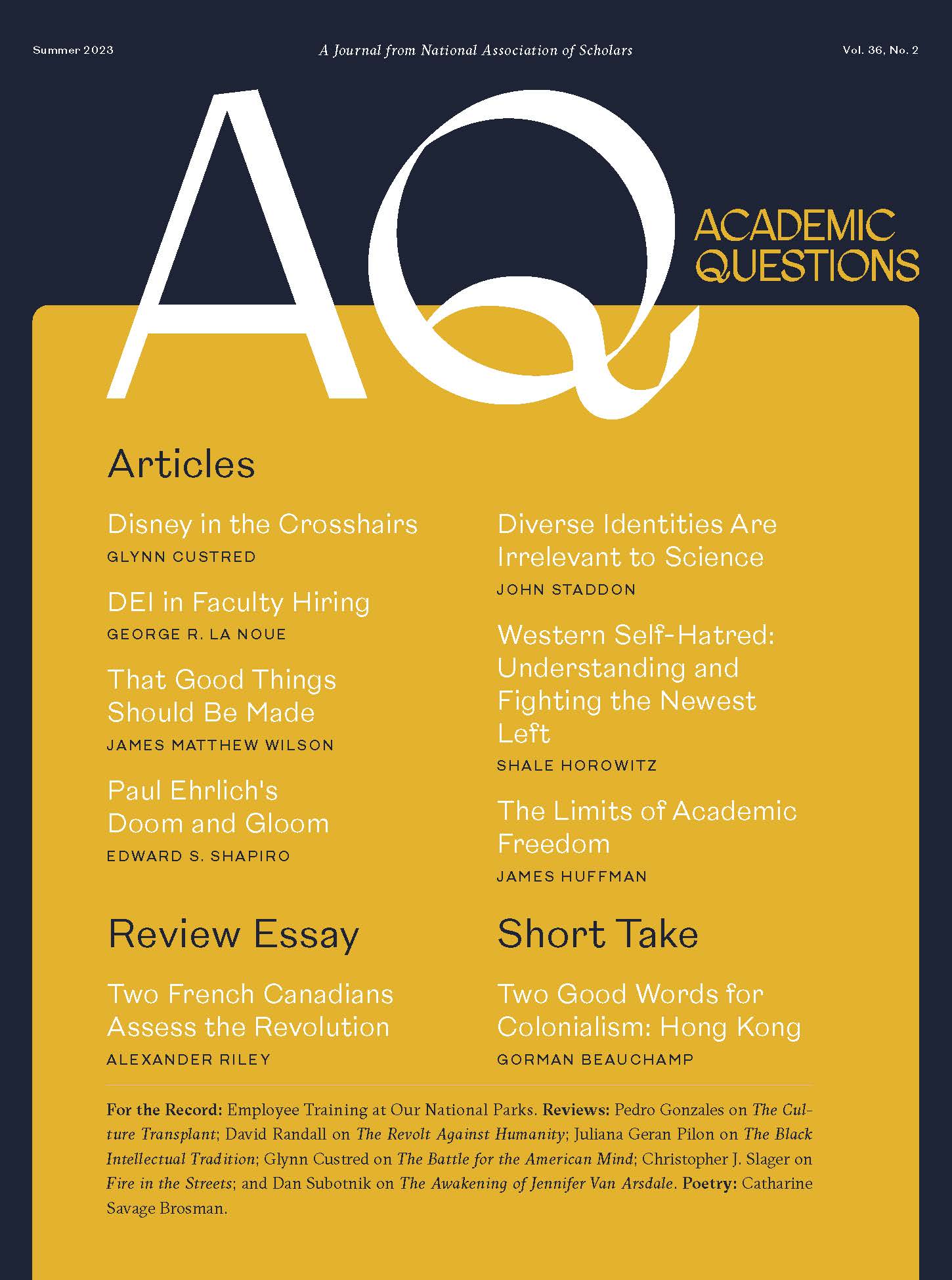Paul R. Ehrlich, the prominent Stanford University biologist and expert on butterflies, became famous in 1968 with the publication of The Population Bomb, which sold an impressive two million copies and enabled him to indulge his passion for flying. He purchased two private planes, thereby contributing to polluting the atmosphere, something which he decried when done by others. In The Population Bomb and elsewhere Ehrlich argued that the world was on the verge of ecological catastrophe unless his recommendations for reducing population and the consumption of the globe’s natural resources were followed. “The battle to feed all of humanity is over,” the book declared. “In the 1970s hundreds of millions of people will starve to death in spite of any crash programs embarked upon now. At this late date nothing can prevent a substantial increase in the world death rate.”
While Ehrlich is a trained entomologist who coined the term “coevolution” and was highly influential in the field of chemical ecology, he apparently knew little about world agricultural production. In fact, the Green Revolution in intensive agriculture allowed food production to increase faster than the population. While the world’s population has exploded from under four billion when Ehrlich’s book was published to over eight billion today, the average person consumes more calories and enjoys better health today than in 1968.1 Life expectancy increased from 72 years to 78 years and the age adjusted death rate dropped from 1,305 per 100,000 in 1968 to 724 per 100,000 in 2018.2 The journalist Jonathan Last put it succinctly when he called The Population Bomb “one of the most spectacularly foolish books ever published.”
Economic inequality, whether within American society or between nations, has been another of Ehrlich’s major targets. Ehrlich is not an economist and does not discuss whether efforts to boost economic equality might involve trade-offs, including reduced investment in technology, which hinder economic growth. A growing economy, more than anything else, improves the economic condition of the working class. Branko Milanovic, an economist at the City University of New York and an authority on inequality, has argued that global inequality has actually declined since the 1980s, and that much of this has been due to the liberalization of the economies of China and India. Ehrlich thinks otherwise and is contemptuous of what he has called the “fairytale ideas” of conventional economic thinking which deifies economic growth and practices exploitation. He believes that the economics taught in academia has been in league with a global economic regime of free-market capitalism responsible for economic rape and the destruction of the environment.
This abhorrence of inequality has not prevented Ehrlich from relishing the life of an upper-income resident of Palo Alto, California who cherishes fine wines, good food, and jetting around the globe to academic conferences and other venues where the academically privileged congregate. He has lived a most fortunate life and partaken in the creature comforts produced by a capitalist economy, while castigating other Americans for seeking to do the same. Hypocrisy, as the seventeenth century Frenchman Francois Duc De La Rouchefoucauld reminded us, is the tribute that vice pays to virtue.
Now, at age ninety, Ehrlich has published Life: A Journey through Science and Politics,3 a memoir recounting his career as a biologist and public intellectual. Ehrlich’s image of the contemporary world is bleak, to put it mildly. Our highly prized freedom to reproduce the species and to grow the economy, he writes, has
fouled the air so that it often became lethal to breathe, began to disrupt greatly the climate on whose stability the human food supply rested, wiped out most of the other large animals and replaced them with domestics, depleted much of our planet’s soils and underground freshwater stores, spread novel poisons everywhere. . . . and developed and used weapons with its potential to kill everyone.4
Should economic development and climate disruption continue, Ehrlich prophesies, future American generations in many parts of the country will be unable to “wander through fields dense with flowers and admire many beautiful butterflies nectaring on them or wake to the songs of abundant birds on spring mornings.”5 Such words are reminiscent of the nostalgic aversion of nineteenth-century Western intellectuals toward industrialization and urbanization. In contrast to Ehrlich’s claim to be an egalitarian, this kind of thinking reflects an elitist mentality in which affordable housing and gainful employment for the masses are to be sacrificed so that the sensitive few can enjoy the delights of nature.
Ehrlich believes the apocalypse is fast approaching. “I’m scared stiff,” he exclaims, “that we don’t have more than a couple of decades in which to change our ways as the biophysical and social existential threats, virtually all exacerbated by population growth, are increasing rapidly.”6 What is necessary he avers, is not a reduction but a reversal in the rate of population growth so that the globe’s population will eventually approximate that of 1900, essentially a 75 percent reduction in population. The alternative is the collapse of civilization as we now know it. Life is a strange title for a book that is so disdainful of the world’s inhabitants.7
For Ehrlich, the pessimism of The Population Bomb remains as relevant today as it ever was. “Indeed,” he writes, “the world now seems to be on the brink of a major rise in harvest shortfalls that may outstrip the global emergency food supply.”8 The issues he highlighted in 1968 remain: “climate disruption, toxification, deterioration of the epidemiological environment, and the threat of nuclear war.”9 To these should be added “widespread famines, pandemics, water shortages, climate disasters, resource wars, and nuclear war devastation—all issues more relevant today than ever.”10
In fact, our environment is far healthier now than it was a century ago: the water we drink is less contaminated, the air is cleaner, the average life span has increased, and many of history’s most lethal diseases such as polio and smallpox have disappeared, and all of this has occurred as the population grew rapidly, defying Ehrlich’s dire warnings. To recognize these facts, however, would deprive radicals of the rationale for a vast re-ordering of contemporary society, a goal that for Ehrlich has apparently trumped any concern for scientific integrity.
For decades Ehrlich has been a key figure among those preaching the imminence of catastrophe if the world does not change its ways, and his predictions carry the imprimatur of scholarship and science, not as easily dismissed as that of an end-of-time’s preacher.11 Ehrlich appeared over twenty times on Johnny Carson’s The Tonight Show during the 1970s and 1980s to peddle the fiction that hundreds of millions of people would perish from starvation not only in Africa or Asia but in North America as well. He forecast that this would come within fifteen years. In fact, the production of food increased during the times when Ehrlich was issuing these ominous predictions. The major problem facing the industrialized world has not been mass starvation but obesity. From 2000 through 2020, for example, the rate of obesity in the United States increased from 30.5 percent to 41.9 percent, and severe obesity increased from 4.7 percent to 9.2 percent.12
The litany of Ehrlich’s mistaken forecasts is remarkable, matched only by the continuing respect accorded him by the gatekeepers of status and opinion. His book is published by a prestigious university press; in 1990 he was awarded a MacArthur Prize Fellowship; and in January, 2023 CBS’s 60 Minutes aired a fawning segment on Ehrlich’s conclusions. Remarkable also has been his refusal to back down when faced with overwhelming evidence that his science has been refuted and his politics misguided. Instead, Ehrlich labors on into his tenth decade, convinced that only fools, bigots, reactionaries, ignoramuses, and Wall Street economists could possibly disagree with him.
A stunning recent example of Ehrlich’s arrogance is his attitude toward those who questioned the conventional wisdom on lockdowns and the wearing of masks during the Covid pandemic. “I can’t recall a major scientific issue,” he says, “where the recommendations of action coming from the public health as well as the knowledgeable scientific communities were more uniform, more directly consequential to individuals and their loved ones, more amenable to individual action, and more widely ignored.”13
In fact, Covid policies such as masking and lockdowns have faced serious questions of efficacy and involved significant social and economic trade-offs. Reputable scientists have lined up on both sides of these issues, with the latest research indicating masking and lockdowns may have been futile or even harmful. A comprehensive analysis by Cochrane, the gold standard for health care data, reported that masks, including the media-revered N-95 medical grade masks, provided no measurable protection from Covid-19. In terms of the lockdowns, children and teens suffered serious emotional, behavioral, and educational damage.14 In 2023, a year or so after most lockdowns ended, a study from the Centers for Disease Control and Prevention found that U.S. teen girls were experiencing record levels of violence, depression, and suicide risk.15
But Ehrlich preferred to accuse those who spoke out against mask mandates and lockdowns, such as the eminent scientists who signed the Great Barrington Declaration, of “lying and quackery” and being responsible for the deaths of hundreds of thousands.16
Life’s many proposals to prevent civilizational collapse reflect its author’s intemperate disregard for consequences. These proposals include outlawing limited liability corporations, forbidding university endowments from investing in fossil fuel-related businesses, and shutting down business schools. One may sympathize with Ehrlich’s desire to reduce the influence of corporate elites and the “finance-centric worldview,” but his primary objectives of slowing economic growth and reducing consumption would devastate the world’s poor and require something approximating totalitarian government.
More problematically for Ehrlich, these proposals would also lead to substantial environmental degradation. Economic development is crucial to environmental health, as wealthy societies are able to afford environmental improvements and cleaner technologies. Wealthy countries are at the top of world environmental rankings tables, while underdeveloped countries burn coal, wood, dung, and any cheap fuel available. Rich countries can afford to spend trillions of dollars on nuclear, solar, and wind energy, even though they are expensive and inefficient forms of energy production.17
Ehrlich’s proposals suggest he is driven less by any concern for the environment, population control, and economic inequality and more by an ideological commitment to ending the expansion of free-market capitalism. This likely accounts for his unwillingness to back down when confronted by contrary evidence. Since 1968, Ehrlich has made dozens of predictions that have not panned out. These include prophesying that England would not exist by 2000 because of population related consequences; that the increase in population will exceed any increase in the supply of food, causing widespread famines; that air pollution would result in the deaths of hundreds of thousands; that America will be forced to ration water by 1974 and food by 1980; that persons born after World War II will have a life expectancy of less than fifty years; that 90 percent of the globe’s tropical rainforests would vanish by 2005; and that smog over Los Angeles and New York will kill at least 200,000. Ehrlich has not been held to account for these false prognostications in any obvious way.
There was, however, one famous public humiliation: Ehrlich’s 1980 wager with Julian Simon.18 Simon, a prominent economist at the University of Maryland and the author of The Ultimate Resource (1981), challenged Ehrlich to a bet over what the prices of five metals would be in 1990. The five metals were to be selected by Ehrlich, and if their prices increased, then Ehrlich’s prediction of a growing shortage of natural resources would be substantiated. But if the prices declined, either because of increasing supply or technological changes which reduced demand, then Simon would win the wager. Ehrlich chose chromium, copper, nickel, tin, and tungsten, all five of which declined in price during the 1980s. He lost the bet and paid Simon $567.07, without any acknowledgement that Simon had been correct.
While commodity prices regularly rise and fall, Simon gambled that a ten-year period was long enough for markets to make appropriate adjustments to supply challenges. Ehrlich’s mistake was to underestimate the capacity of humans to overcome these challenges. For him, people were essentially consumers and not producers. Simon, by contrast, viewed people as productive and inventive, not merely consumers. As he noted in The Ultimate Resource, “skilled, spirited, and hopeful people” are the ultimate resource because they “exert their wills and imaginations for their own benefit, and so, inevitably for the benefit of us all.” Over time they will address resource depletion by inventing replacements, curbing consumption, and boosting efficiency. Humans don’t merely take from the ecosystem; they also shape, repair, and augment it.
This was a far more optimistic and accurate view of the world than that conveyed in The Population Bomb. As the George Mason university economist Peter Jacobsen noted, Ehrlich’s errors stem from his hostility toward the dynamism of capitalism and population. This leads him to focusing solely on the costs and not the benefits that people bring to the table.19 Not surprisingly, Ehrlich does not mention his wager with Simon in his memoir.
Though a staunch atheist, Ehrlich has an almost religious commitment to a complete societal overhaul under the auspices of enlightened scientists such as himself. His memoir is replete with sarcastic comments on the naiveté and foolishness of the religious, and he accuses Christianity and Judaism of propagating “a host of crackpot ideas . . . about anything from vaccination to racial, ethnoreligious, and gender differences.” He proposes to replace transcendent religion with what he calls a “pseudo-religion” that will evangelize the world and confront the “existential threats” facing mankind. It has been suggested that even atheists seek to live out their lives according to a comprehensive moral code. For Ehrlich, the bible of this new religion is The Population Bomb and he is one of its prophets. One is reminded of G. K. Chesterton’s comment that the problem with atheists is not that they believe in nothing but that they can believe in anything.
Whatever the case may be, Ehrlich has subordinated his quest for scientific understanding to his political priorities, and Life exemplifies contemporary declinist punditry. Ehrlich is certainly a distinguished biologist, but when he holds forth on demography, capitalism, and the future of humanity—to say nothing of his opinions on the Department of Defense budget, the state of Israel, the Vietnam War, the sins of Condoleezza Rice, the virtues of Noam Chomsky, and other such matters—he should be accorded no more deference than that normally paid to any other self-styled pundit.
Edward S. Shapiro is professor of history emeritus at Seton Hall University; [email protected]. He is the author of A Time for Healing: American Jewry since World War II (1992) and Crown Heights: Blacks, Jews, and the Brooklyn Riot of 1991 (2006). His latest book, A Unique People in a Unique Land (2022) was published by Academic Studies Press. He last appeared in AQ with “The Right Stuff” (Spring 2023), a review of Matthew Continetti’s The Right: The Hundred Year War for American Conservatism.
1Mark Marano, “Paul Ehrlich’s Epic Fail: Why the ‘Population Bomb’ Never Exploded,” ClimateDepot.com., March 1, 2018.
2National Center for Health Statistics, Data Visualization Gallery, “Mortality Trends in the United States, 1900-2018.”
3Paul R. Ehrlich, Life: A Journey through Science and Politics (New Haven, Ct.: Yale University Press, 2023).
4Ibid., 308.
5Ibid., 225-26.
6Ibid., 289-90.
7Ehrlich did his part in discouraging overpopulation by fathering only one child. He favored heavy taxes and other penalties on families with multiple children.
8Ibid., 297.
9Ibid., 293, 297.
10Ibid., 297.
11For a general overview of such contemporary doom and gloom thinking, see Gregg Easterbrook, It’s Better than It Looks: Reasons for Optimism in an Age of Fear (New York: PublicAffairs, 2018). Easterbrook described Ehrlich as “a believed figure in the declinist worldview.” (5)
12Adult Obesity Facts, “Obesity is a common, serious, and costly disease.” Centers for Disease Control and Prevention, May 17, 2022.
13Ehrlich, Life, 303.
14Giacomo Bignardi et al., “Longitudinal increases in childhood depression symptoms during the COVID-19 lockdown,” Archives of Disease in Childhood 106, no. 8 (2021); T. Raviv et al., “Caregiver Perceptions of Children’s Psychological Well-being During the COVID-19 Pandemic,” JAMA Network (April 29, 2021), doi:10.1001/jamanetworkopen.2021.11103.
15Youth Risk Behavior Survey: Data Summary and Trends Report, Centers for Disease Control and Prevention, https://www.cdc.gov/healthyyouth/data/yrbs/pdf/YRBS Data-Summary-Trends Report2023.
16Ehrlich, Life, 304.
17Marian Tupy, “Still Wrong! Paul Ehrlich Interview on CBS’s 60 Minutes,” Newgeography.com, January 6, 2023.
18For the wager, see Paul Sabin, The Bet: Paul Ehrlich, Julian Simon, and Our Gamble over Earth’s Future (New Haven, Ct.: Yale University Press, 2013).
19Peter Jacobsen, “Paul Ehrlich: Wrong on 60 Minutes and for Almost 60 Years,” Foundation for Economic Education, January 4, 2023.
Photo by Clyde Thomas on Unsplash














